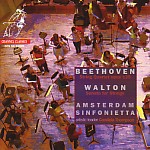The coupling of Walton and Beethoven isn’t as odd as you might at first think. Beethoven’s late quartet style is so timeless and modern sounding that it offers all kinds of valid perspectives on much later music, while Walton’s Sonata for Strings, an arrangement of his earlier string quartet, isn’t so advanced harmonically that the pairing creates an uncomfortable mix of styles. Interestingly, both works share the same form (quick, scherzo, lento, quick) which makes the comparison even more apt. Besides, when the playing is this good and the music this attractive, who cares?
The rhythmic precision of the Amsterdam Sinfonietta in the second and fourth movements of the Walton is simply astounding, and it doesn’t hurt in the Vivace of the Beethoven either. Unlike, say, Bernstein’s recording of Op. 135 with the Vienna Philharmonic strings, this group uses smaller forces to try (as the notes say) to retain some of the intimacy of the chamber original. And when the playing features such impeccable intonation and corporate virtuosity, such unforced lyricism in the two slow movements, that’s just what they achieve. Toss in state-of-the-art sonics, both in stereo and fabulously realistic 5.0 multichannel sound, and the result is irresistible. [2/8/2006]
































